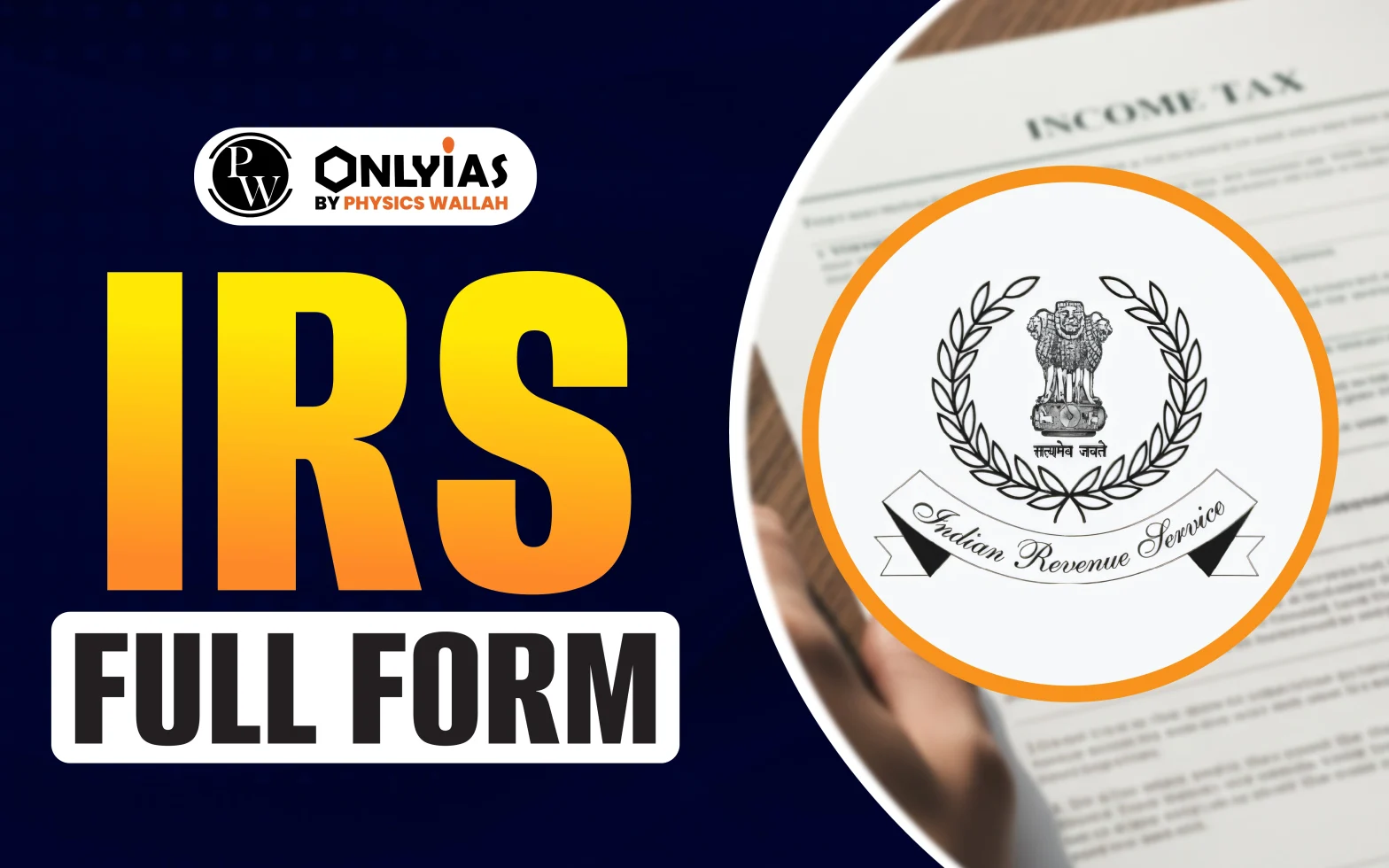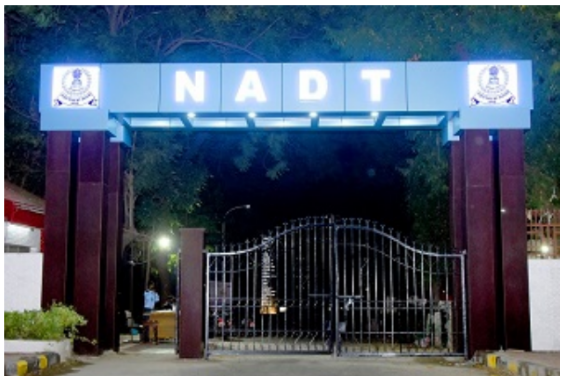IRS full form is Indian Revenue Service. Know how to become an IRS officer through UPSC, roles, powers, salary structure, perks, and responsibilities. Learn about IRS Income Tax & Customs branches, training, eligibility, and career growth.

IRS Full Form is Indian Revenue Service. It is the administrative revenue service of the Government of India (GOI), classified under Group ‘A’ services of the Central Civil Services. The Indian Revenue Service is instrumental in implementing the country’s fiscal policies, administering tax laws, and ensuring revenue collection essential for governance, development, and security. IRS officers are recruited through the prestigious Civil Services Examination conducted annually by the Union Public Service Commission (UPSC).
The IRS Full Form stands for Indian Revenue Service. It is responsible for enforcing and collecting direct taxes through the Income Tax Department (ITD) and indirect taxes through the Customs and Central Excise Departments.
The emblem of the Income Tax Department, “Kosha Moolo Dandah” meaning “Treasury is the root of administration,” aptly reflects its function.
IRS is divided into two major branches:
| IRS Overview | |
| Particulars | Details |
| IRS Full Form | Indian Revenue Service |
| Controlling Ministry | Ministry of Finance, Department of Revenue |
| Branches | IRS (Income Tax) & IRS (Customs and Central Excise) |
| Training Academy | NADT, Nagpur & NACIN, Faridabad |
| Recruitment Mode | UPSC Civil Services Examination |
| Service Type | Group ‘A’ Central Civil Services |
To become an IRS officer, aspirants must clear the UPSC Civil Services Examination (CSE), one of the most competitive and prestigious exams in India. The selection process comprises three stages:
After selection, IRS officer trainees undergo a 4-month Foundation Course at LBSNAA, followed by a 16-month specialised training at institutions like:

Source: Nadt.Gov.in

Source: ajnifm.ac.in
They also participate in national and international field postings and attachments.
The IRS officer power and duties and responsibilities are multifaceted:
They also serve key roles at border check-posts, participate in anti-smuggling patrols, and handle sensitive assignments relating to financial intelligence and enforcement.
To join the Indian Revenue Service, aspirants must clear one of the most prestigious and competitive examinations, the “Civil Services Examination (CSE)” conducted by the Union Public Service Commission (UPSC). This exam is the exclusive gateway to enter Group ‘A’ services of the Government of India, including the IRS (Income Tax) and IRS (Customs & Indirect Taxes).
The UPSC Civil Services Examination is held annually and is designed to test a candidate’s aptitude, general awareness, critical thinking, and administrative abilities. The selection process for IRS officers through the UPSC CSE comprises three rigorous stages:
Once candidates clear all three stages and secure a rank high enough in the final merit list, they are allotted the IRS based on their preference and rank.
The IRS officer salary is structured as per the 7th Central Pay Commission. Apart from salary, IRS officers enjoy various allowances and perks.
| IRS Full Form | |||
| Rank | Department | Pay Band | Grade Pay / Level |
| Assistant Commissioner | Income Tax | ₹15,600–₹39,100 | ₹5,400 (Level 10) |
| Deputy Commissioner | Income Tax | ₹15,600–₹39,100 | ₹6,600 (Level 11) |
| Joint Commissioner | Income Tax | ₹15,600–₹39,100 | ₹7,600 (Level 12) |
| Additional Commissioner | Income Tax | ₹37,400–₹67,000 | ₹8,700 (Level 13) |
| Commissioner | Income Tax | ₹37,400–₹67,000 | ₹10,000 (Level 14) |
| Principal Commissioner | Income Tax | ₹75,500–₹80,000 | Apex Scale |
| Chief Commissioner | Income Tax | ₹75,500–₹80,000 | Apex Scale |
| Principal Chief Commissioner | Income Tax | ₹80,000 (Fixed) | Apex Scale |
Besides the IRS officer salary, several non-monetary perks make the service attractive:
To become an IRS officer, candidates must fulfill specific eligibility conditions regarding nationality, education, and age. The UPSC sets these criteria in accordance with the Government of India norms.
The Indian Revenue Service offers an ideal combination of professional satisfaction and personal stability. Its structured work hours and urban postings make it a highly desirable career choice among the civil services.
Candidates with a keen interest in taxation, finance, and national fiscal policy find the IRS service particularly rewarding.
The history of the IRS dates back to the British colonial era, reflecting its deep institutional roots. Over time, the IRS has developed into a highly sophisticated and vital branch of India’s civil services.
The Central Board of Revenue was established in 1924 to streamline taxation, and after independence, it was reorganised under the Ministry of Finance. Today, IRS officers are instrumental in managing national revenues, combating financial crimes, and upholding India’s tax system.
The Indian Revenue Service performs a wide spectrum of financial, enforcement, and policy-making duties under the Ministry of Finance. IRS officers play an indispensable role in strengthening the economic backbone of the country.
The IRS headquarters is in New Delhi, and the cadre is controlled by the Department of Revenue.
The IRS Full Form, Indian Revenue Service, represents one of the most prestigious services in India’s bureaucratic structure. It offers a dynamic career with intellectual satisfaction, national responsibility, and financial stability. For aspirants interested in taxation, public finance, and enforcement, the IRS provides a promising and impactful career path.
By understanding what is IRS, how to become IRS officer, what exam for IRS, and knowing the IRS officer power and duties and responsibilities, aspirants can better align their career goals with this pivotal service. The IRS officer salary, perks, and stability further enhance the attractiveness of this service in the civil services hierarchy.
Ready to boost your UPSC 2025 preparation? Join PW’s UPSC online courses today!
The IRS full form is Indian Revenue Service, a Group A central service responsible for tax administration.
IRS refers to the Indian Revenue Service. It manages direct and indirect tax collection and enforces tax laws.
IRS officers are civil servants managing tax assessment, enforcement, policy implementation, and anti-evasion efforts.
To become an IRS officer, clear the UPSC Civil Services Examination, followed by specialized training in tax law and policy.
The UPSC Civil Services Exam is the required exam for IRS officer recruitment in India.
The IRS officer salary starts from ₹56,100 and goes up to ₹2,25,000, depending on rank, with perks like housing and travel allowance.
<div class="new-fform">
</div>